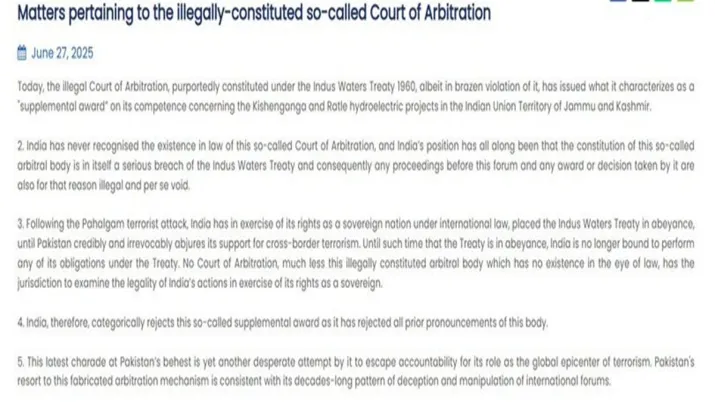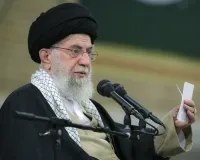India rejects 'supplemental award' on J-K dam projects by 'illegal' Court of Arbitration | Check full details

India has categorically rejected a ruling by a so-called Court of Arbitration that issued a 'supplemental award' concerning its Kishenganga and Ratle hydroelectric projects in Jammu and Kashmir. The projects, situated on the western rivers of the Indus basin, have been at the center of ongoing objections by Pakistan. In a strongly worded statement issued on Friday (June 27), the Ministry of External Affairs (MEA) said the Court of Arbitration is 'illegally constituted' and its actions are a serious breach of the Indus Water Treaty (IWT) signed in 1960 between India and Pakistan under World Bank supervision.
India declares arbitration proceedings 'null and void'
“India has never recognised the existence in law of this so-called Court of Arbitration... any award or decision taken by it is illegal and per se void,” the MEA said.
Indus Water Treaty put on hold post-Pahalgam terror attack
India emphasised that it had placed the Indus Water Treaty in abeyance following the Pahalgam terrorist attack on April 22, which claimed 26 lives. “Until Pakistan credibly and irrevocably abjures cross-border terrorism, India is not bound to perform any obligations under the treaty,” the statement noted.
India asserted that no international or arbitration body has jurisdiction over its sovereign actions, especially when a treaty is suspended.
India labels Pakistan’s move as desperate and deceptive
The MEA described the arbitration move as the latest charade orchestrated by Pakistan to deflect from its role in fostering terrorism. “This is yet another desperate attempt by Pakistan to avoid accountability as the global epicentre of terrorism,” the government said, adding that Pakistan’s reliance on “fabricated mechanisms” reflects its pattern of manipulating international forums.
India reaffirmed its position by rejecting the supplemental award, as it had done with previous pronouncements by the arbitral body.

Pakistan’s objections to Kishenganga and Ratle hydroelectric projects
Pakistan has repeatedly objected to the 330 MW Kishenganga (on the Jhelum) and 850 MW Ratle (on the Chenab) hydro projects, arguing they would disrupt water flows into its territory, which depends heavily on river-based irrigation. Islamabad claims these constructions violate the Indus Water Treaty.
India, however, maintains that both projects are well within the treaty’s parameters, which allow run-of-the-river hydroelectric projects on western rivers.
India seeks pause in ongoing dispute resolution process
According to the government sources, India has asked for a pause in the current dispute proceedings and written to World Bank-appointed neutral expert Michel Lino to suspend the agreed dispute resolution programme, including written submissions and joint meetings scheduled later this year.
Political response and India's strategic position
Jal Shakti Minister CR Paatil commented on Pakistan's diplomatic attempts to reverse the treaty suspension, calling them mere formalities that won’t influence India’s stance. India has signalled a broader shift toward reclaiming full control over its usage of the western rivers, arguing that the treaty, once symbolic of cooperation, has become untenable amid ongoing security threats.
About The Author
Welcome to Aryan Age, an English newspaper that has been serving readers since 2011 from Delhi. With a loyal circulation of over 19,000, we are dedicated to providing our readers with the latest news and information, as well as insightful analysis and commentary that help them navigate the complex and rapidly changing world.











Comment List